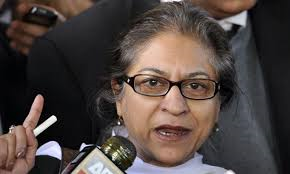
LAHORE, Jan. 1: The parliament mustn’t give legal cover to military courts, the Lahore High Court Bar Association said at its general house meeting on Thursday. The LHCBA passed a resolution condemning the plan to set up military courts to hear terrorism cases.
A general house meeting was called to deliberate on the issue. The LHCBA announced that it would call an All Pakistan Lawyers’ Convention to devise a strategy to resist the move.
Former Supreme Court Bar Association president Asma Jahangir said there was a need to cooperate with the armed forces in fighting the menace of terrorism. The people of the country gave a massive portion of the national budget to the armed forces each year to help them fight terrorism. “But they couldn’t even protect a school in their own cantonment.”
Jehangir said the judiciary and the democratic setup had its faults but they were still better than martial law or military courts. “These courts cannot resolve conflict.” Under the military, there could be no separation of powers, she said. “The whole system would collapse.”
Jehangir said that the parliament should not wait for the judiciary to declare the amendment illegal. It shouldn’t pass the bill at all.
The first step the government needs to take is to take note of all sympathisers of terrorists from among politicians and within the armed forces. “Everyone knows that the FC is protecting Lashkar-i-Jhangvi in Balochistan. The only solution to the problem of terrorism is the supremacy of civil rule.”
There is no doubt that Pakistan is faced with a severe terrorism problem, but setting up military courts will not change a thing, former SCBA president Advocate Hamid Khan said.
Pakistan had tried and tested military courts since 1958 and nothing good had come of it, he said. “Setting up military courts gives the impression that the attack in Peshawar was the judiciary’s fault.” It was clear that the military and intelligence agencies had failed in gathering intelligence about the attack and pre-empting it, said Khan. The armed forces hadn’t been able to kill any terrorists involved in the attack, the culprits blew themselves up.
Khan said the prosecution was to blame for not collecting enough evidence to bring the culprits to book. Whatever reforms the country needed in light of the war on terror must be taken within the Constitution, he said. “The security and protection the government plans to provide military courts should be extended to judges.” The state has created the impression that protection and security extends to the armed forces and not the civilians. “This is a failure of the state,” he said.
Small militia groups under the banners of Lashkar and Sippah needed to be disbanded immediately, said Khan. “Regardless of their reputation, every organisation that preached a version of militant Islam needs to be disarmed,” he said.
Advocate Tanveer Chaudhry was critical of judges. Today courts act like dictators, he said. “One of the judges took a traffic warden into custody after he asked him to queue up to get a driving licence; another judge ordered four robbers to be shot dead for robbing the house of a civil court judge in Sheikhupura,” Chaudhry said. “An MS was put in handcuffs for not treating an LHC judge’s daughter on priority… Is this a civilian judiciary?” He said the country’s judiciary were acting like core commanders. Advocate Raja Zulqarnain said lawyers would not accept a move to set up military courts. He said politicians and military men provided weapons to the Jamatud Dawa and the Sippah-i-Sahaba. “Why are they protecting hardliners?”
LHCBA’s acting president Amir Jalil Siddiqi said the bar should have announced its view point right after political parties made an announcement in this regard. He said Nawaz Sharif became prime minister because of the Lawyers’ Movement. “We will not let him commit an illegal act.”
Published in The Express Tribune, January 2nd, 2015.
